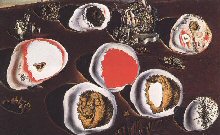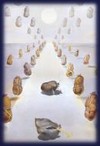 [en]
[en]
We are scattered over the Net, a piece in a social networking site, another piece in a different site, in a dating site, we write in our blog and we comment on others’ blogs, meet on chats and join forums on the most diverse subjects. Furthermore, we keep several contacts by email.
Our identities are becoming ever more fluid, we feel affiliated with various situations with only a part of ourselves. The real communities of family and friends too are now more like windows which maybe we would prefer to also manage in our computers. Lifelogging projects want to extend the scope of our life activities which are processed and managed online.
Sherry Turkle described in her books The Second Self: Computers and the Human Spirit (1984) and Life on the Screen: Identity in the Age of the Internet the exploration of the psychological parts in role-playing games and later on the Net. She thought that having the chance to live our object relationships could be important to individualize our identities.
One aspect of our online identities, explored by several experts, is the attenuation of inhibitions in online life. The superego, our psyche’s structure devoted to criticizing ourselves, to inhibit our actions and desires, is weakened by our online activity. Without superego pressure we can explore parts which are usually kept in the shadow.
Using false identities, as happened more frequently in the first years on the Internet, hides our real identities (partly for our own selves as well) and the superego is hidden along with it.
[/en][it]
Siamo sparpagliati nella rete, un pezzo su un sito di social networking, un pezzo su un altro, un altro pezzo su un sito di incontri, poi scriviamo sul nostro blog e commentiamo sui blog degli altri, ci troviamo sulle chat, e poi partecipiamo ai forum sui temi più disparati; inoltre manteniamo diversi contatti via email.
La nostra identità è sempre più fluida, ci sentiamo di appartenere alle diverse situazioni solo con una parte di noi stessi. Le comunità reali della famiglia e degli amici sono altre finestre che magari vorremmo poterle gestire a loro volta con computer. I progetti di lifelogging vogliono estendere le attività della nostra vita che vengono elaborate e gestite online.
Sherry Turkle aveva già descritto nel suo libro Il Secondo Io del 1984, e poi con La vita sullo schermo l’esplorazione delle parti psicologiche nei giochi di ruolo e poi nella Rete. La Turkle riteneva che il poter vivere i propri oggetti di relazione potesse essere importante per individuare la propria identità.
Un aspetto della nostra identità online, anche questo esplorato da diversi studiosi, è l’attenuazione delle inibizioni nella nostra vita online. Il superego, la struttura della nostra psiche dedicata a criticare noi stessi, ad inibire le nostre azioni e desideri, viene indebolito dalla nostra attività online. Senza la pressione del superego possiamo esplorare parti di noi stessi che normalmente sono in ombra.
Usare una falsa identità, come succedeva più frequentemente nei primi tempi della Rete, ci nasconde la nostra vera identità (in parte anche a noi stessi) e con questa anche il superego inibente.
[/it]
Leggi tutto “I click, therefore I am: Toward outsourcing our identity”

 [en]
[en]